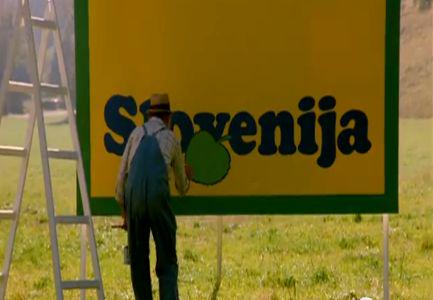A commercial intended to remind Slovenians of the importance of tourism became a symbol of the Slovenian Spring.
In the 1980s, Slovenian tourism authorities weren’t satisfied with public opinion research: The results showed that too few Slovenians were aware just how important tourism was for the republic’s economy and its future development. To fix this, they selected a forward-thinking ad agency – Studio Marketing – and asked it to design a campaign that would convince ordinary people of the importance of tourism.
The resulting campaign shook all of Yugoslavia. Its most prominent element was a television commercial that launched in 1986 and featured a man painting a billboard in a lush Slovenian valley. Director Jaka Judnič interspersed that footage with shots of hardworking, conscientious Slovenians making their homeland more welcoming to visitors by painting fences, setting restaurant tables, offering T-shirts, and so on. All this was accompanied by a memorable song extolling pride and hard work. At first glance, the commercial could hardly have been more innocuous.
But in the context of Communist Yugoslavia, it was seen by many as a daring provocation. For the first time ever, a campaign focused on a single Yugoslav republic. It reassured ordinary people that it was perfectly acceptable for them to be proud of Slovenia rather than Yugoslavia as a whole. Even the slogan was considered subtly provocative, consisting simply of “Slovenija, moja dežela” (“Slovenia, my land”) – with no reference to Yugoslavia.
The campaign triggered widespread condemnation from the rest of Yugoslavia. Its creators were accused of undermining Yugoslav unity and even fostering Slovenian secessionism. The commercial became so infamous that dežela – the Slovenian word for “land” – became a slightly pejorative nickname for Slovenia itself in the other republics.
Meanwhile, the ad campaign was embraced in Slovenia like no other before or since. The premiere of the commercial coincided with the advent of Slovenian Spring – a period of political liberalization and the awakening of national consciousness. For many Slovenians, the simple yet heartwarming commercial intended to promote tourism ended up becominga symbol of reawakened national pride. After decades of political dominance from Belgrade, the campaign reminded people of their own national roots. And as the Yugoslav crisis intensified, more and more people were coming to realize that Slovenia, rather than Yugoslavia, was indeed their true homeland.


































































